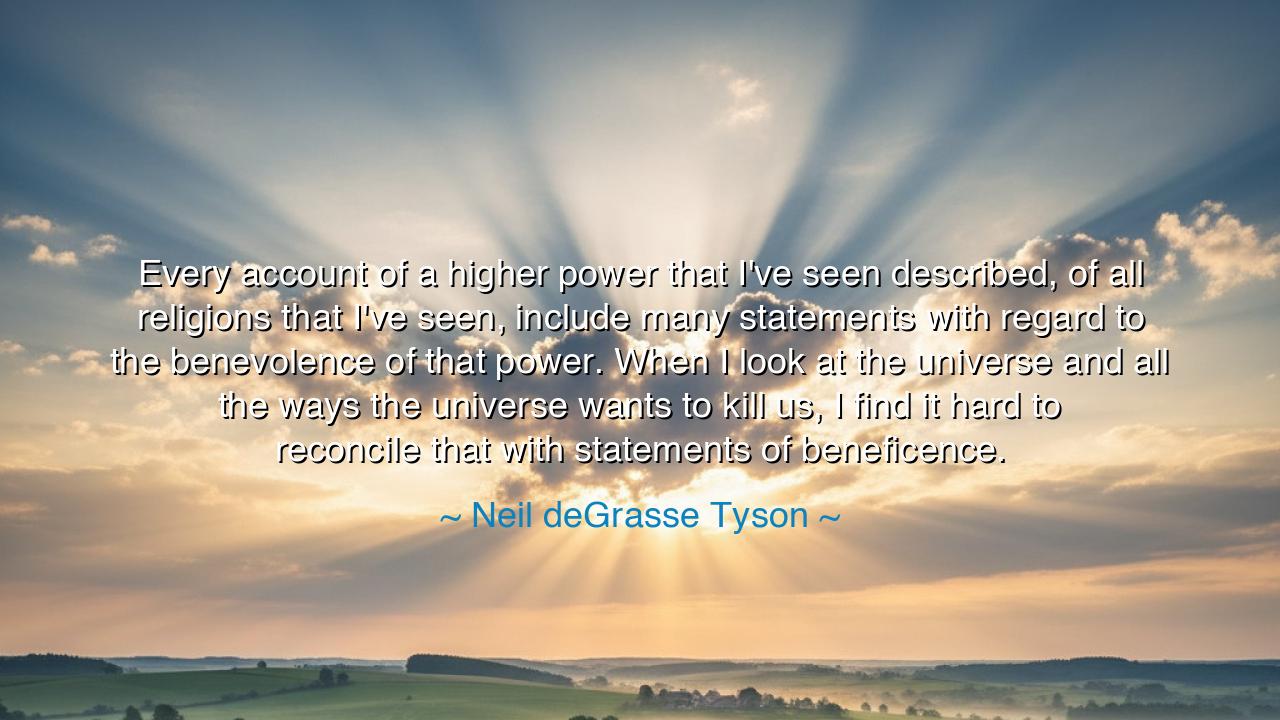
Every account of a higher power that I've seen described, of all
Every account of a higher power that I've seen described, of all religions that I've seen, include many statements with regard to the benevolence of that power. When I look at the universe and all the ways the universe wants to kill us, I find it hard to reconcile that with statements of beneficence.






Hearken, O children of reflection, to the contemplations of Neil deGrasse Tyson, who gazes upon the cosmos with the eyes of both the scientist and the seeker. He observes that in the teachings of many religions, the higher power is depicted as benevolent, a force of mercy and protection. Yet when he turns his vision to the vast expanse of the universe, to the stars, the storms, and the countless dangers that imperil life, he finds it difficult to reconcile the notion of beneficence with the harsh realities of existence. Here is a teaching for the ages: the world is a place of both awe and peril, and understanding it demands courage, curiosity, and honest reflection.
The origin of this reflection is found in Tyson’s life as an astrophysicist and educator, one who has spent decades studying the cosmos and seeking to illuminate the mysteries of existence. His observation arises from the juxtaposition of human spiritual aspiration with the cold, indifferent laws of physics and nature. In the vast theater of the universe, planets collide, stars explode, and deadly forces swirl, revealing a world that is not inherently gentle, and often indifferent to mortal hopes and fears.
The meaning of this aphorism extends to the eternal dialogue between faith and reason. It reminds us that while the concept of a higher power promises guidance, protection, and love, the reality of the natural world presents suffering, danger, and unpredictability. Tyson’s words do not dismiss spirituality, but invite a deeper examination: how can one reconcile the human desire for benevolence with a universe that is sometimes harsh, chaotic, and lethal? This tension urges the mind to seek understanding beyond simple answers, to embrace both curiosity and humility.
History provides witness to this tension. Consider the voyages of Christopher Columbus or the daring expeditions of early astronomers like Galileo Galilei, who confronted the vast, sometimes hostile unknown. They faced storms, disease, and cosmic mysteries that challenged the comforts of human expectation. Yet their courage and pursuit of knowledge reflected an acknowledgment of the universe’s power and indifference, and a quest to find understanding amidst its perils—a reconciliation of wonder and danger, much as Tyson describes.
Moreover, this reflection teaches that wisdom lies not in blind acceptance, but in the rigorous pursuit of understanding. To study the cosmos, to measure, observe, and question, is to confront both the magnificence and the menace of existence. Tyson’s insight encourages mortals to cultivate both awe and discernment, to respect the forces of the universe while reflecting deeply on the nature of benevolence, purpose, and survival.
O generations yet unborn, take this counsel to heart: gaze upon the stars with wonder, yet do not fear to see the stark realities they reveal. Seek knowledge with courage, question the apparent contradictions between faith and experience, and embrace the eternal quest to reconcile the beauty and peril of existence. For in this pursuit lies the essence of understanding, the love of wisdom, and the courage to dwell within a universe at once magnificent and merciless.






HLNguyen Ha Ly
I feel this quote emphasizes the contrast between empirical observation and spiritual belief. How do people reconcile the random, often lethal forces of the universe with teachings of divine care and protection? I’m curious if Tyson is advocating for a more skeptical or evidence-based approach to theological claims. Could his perspective encourage critical thinking about faith while also appreciating the moral and communal aspects of religion? This raises questions about how humans interpret benevolence in a universe that operates independently of their desires.
HKHoang Khanh
This perspective invites reflection on suffering and the human tendency to project moral qualities onto nature. Is Tyson highlighting the limits of anthropomorphism in our understanding of the cosmos? I wonder whether experiencing the universe’s dangers makes faith in a benevolent deity harder to maintain, or whether it strengthens reliance on metaphorical interpretations. Could this observation inspire dialogue between science and religion, prompting both communities to explore ethical and existential questions more deeply without requiring strict doctrinal alignment?
MAPham Mai Anh
I find this statement thought-provoking because it confronts the gap between religious claims of goodness and the observable dangers of the natural world. Could this be a critique of literal interpretations of divine benevolence? I’m curious how theologians and philosophers have addressed this tension historically. Does the harshness of the universe imply that morality and compassion are purely human constructs rather than divinely mandated? This makes me reflect on the role of science in shaping our understanding of existence and challenging traditional notions of providence.
HNVu Hai Nam
Reading this, I feel intrigued and challenged. Is Tyson suggesting that the universe itself is indifferent rather than malicious or benevolent? How do we differentiate between the intentions attributed to a higher power and the natural forces that affect our survival? I’m curious whether this viewpoint necessarily excludes spirituality, or if it invites a reinterpretation of divine benevolence in a more abstract or metaphorical sense. Could acknowledging nature’s harshness foster a more realistic and resilient approach to life?
TTThu Trang
This quote raises deep questions about theodicy and the nature of the universe. How can one reconcile the idea of a benevolent higher power with the apparent cruelty and randomness in nature? I wonder if Tyson is highlighting a tension between scientific observation and traditional religious interpretations. Could this perspective encourage people to rethink how they conceptualize divinity or the purpose of suffering? It also makes me question whether the perception of beneficence is subjective, shaped by human experience and survival bias.